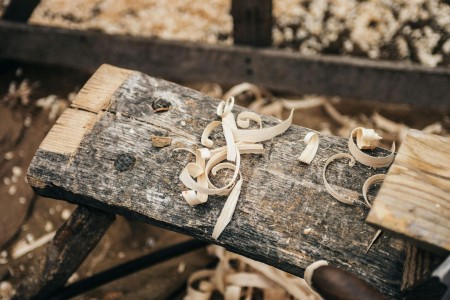


Dowel Pins vs. Nails: Which Is Better for Woodworking?
Because of their speed and simplicity of use, nails are often employed in building and woodworking. They can be easily hammered into wood and are suitable for keeping parts together when absolute alignment isn’t critical.
But here’s the problem: nails aren’t very precise. They may bend or shift during installation and generally don’t provide the structural alignment sometimes required in fine woodwork or cabinetry. Nails can also come loose over time from vibration, wood expansion, or contraction.
By carefully drilling holes, dowel pins guarantee stability and accuracy. Dowel pins give a more attractive look,a more robust joint, and better alignment than nails when you construct a cabinet door or a chair.
Rivets find use in situations needing a permanent bond. Once installed, they cannot be removed without damaging the material. This makes them excellent for structural uses, including bridges or planes.
However, they don’t offer the kind of precise alignment that dowel pins do. Rivets are mostly about strength and permanence. Dowel pins, by contrast, are about positioning accuracy.
They ensure the components are precisely aligned before another fastener or glue closes off portions. Dowel pins are preferable if you are working on something that must be either precisely aligned or disassembled later (like jigs or machinery).
The biggest advantage of dowel pins is alignment. They’re not used just to hold things in place but to make sure they’re in the right place. That subtle difference matters a lot in engineering and high-tolerance environments.
They’re also incredibly strong in shear strength. Still, given their qualities, dowel pins are not ideal for every circumstance. First, they demand exact drilling. Even a tiny discrepancy in the holes could cause the components to not line up or fit properly. During installation, this implies you will require great tools and meticulous attention to everything.
Another strength of dowel pins is their aesthetic cleanliness. In woodworking, they’re hidden from view, unlike screws or nails. This allows for seamless, professional finishes, especially important in visible furniture pieces.
Still, given their qualities, dowel pins are not ideal for every circumstance. First, they demand precision drilling. Even a tiny discrepancy in the holes could cause the components to not line up or fit properly. During installation, this implies you will require great tools and meticulous attention to everything.
Press-fit dowel pins also typically are not easy to remove. Once installed, they are intended to remain fixed. If you are putting together something that could require disassembly or modification, screws or bolts would be more suited.
They also lack very little clamping force. Still, screws, glue, or other fasteners would do the main work if your aim is to hold parts together under pressure.
When should you reach for dowel pins instead of other fastening methods?
A dowel pin will give alignment that screws or nails just cannot match if you are creating something needs exact positioning, such as a jig, a machine fixture, or precision tooling. They are particularly valuable in repetitive assemblies, where components have to be reassembled without losing alignment.
Conversely, nails or screws are quicker and simpler to use if you’re doing rapid construction, framing, or temporary joining. High tension or removability calls for bolts; rivets are perfect for permanent, load-bearing uses.
It all comes down to the right tool for the job. Though not a universal substitute, dowel pins are difficult to match when accuracy is essential.
In the fastener world, it’s simple to forget something as basic as a dowel pin. Still, these little, unpretentious cylinders are absolutely vital for maintaining efficiency, consistency, and precision throughout many sectors. Whether you are building exact tools or a wooden chair, dowel pins provide special advantages that no other fastener can completely duplicate.
Knowing the distinctions between dowel pins and other fastening techniques will help you to approach projects more logically. It’s not just about holding things together, but holding them correctly.
